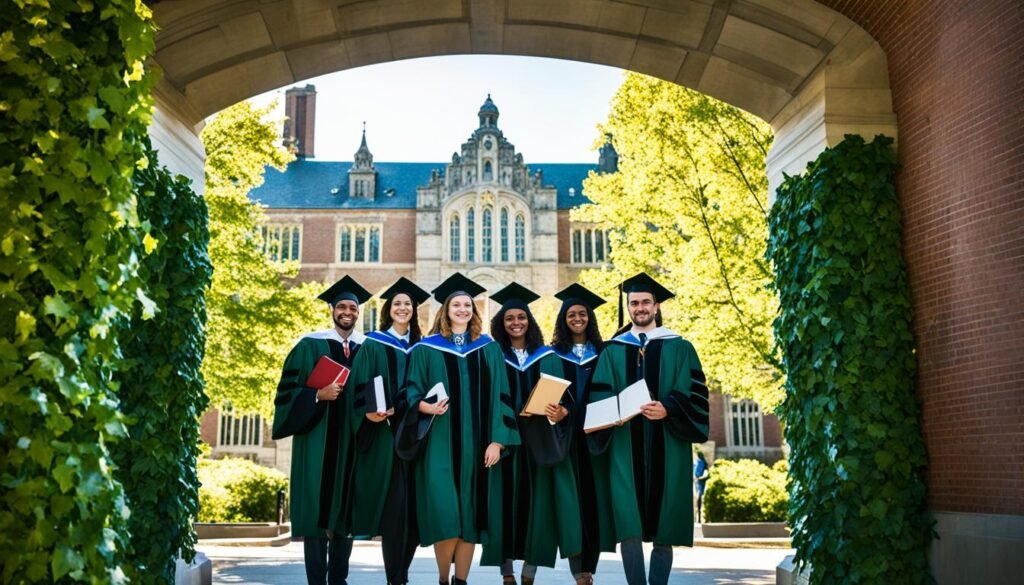When mapping out the trajectory to the pinnacle of academic achievement, have you ever stopped to consider if a Master’s pedigree is indispensable? It’s a question that may challenge the traditionalist’s view but remains pivotal for the avant-garde scholar. In the realm of graduate studies, the route to a doctoral degree isn’t set in stone. Believe it or not, some intrepid intellectual explorers are embarking on PhD programs without the once deemed essential master’s waypoint.
Various institutions are updating their PhD program criteria, offering you the chance to reduce both the cost and time associated with advanced educational attainment. But what does this mean for doctoral degree prerequisites, and more importantly, what does it mean for you?
Key Takeaways
- Understanding possible exemptions from the traditional requirement of a master’s degree for PhD program entry.
- Identifying the attributes that can qualify undergraduates for direct doctoral studies.
- Exploring the financial and temporal efficiency of pursuing a PhD without a master’s.
- Recognizing the shift in graduate studies towards more inclusivity in doctoral degree prerequisites.
- Discovering if your academic and potential research experience aligns with these new entry pathways.
Exploring the Traditional PhD Pathway vs. Non-Traditional Approaches
When you embark on the quest for a doctoral degree, the path you choose can significantly impact your academic and professional journey. While the traditional academic route to a PhD typically progresses from undergraduate to master’s and finally to doctoral studies, increasingly, institutions are offering alternative doctoral admissions that cater to the unique strengths and experiences of diverse candidates.
Understanding the PhD Journey
Your education pathway to a PhD is more than a sequence of degrees; it’s an intellectual endeavor that hones your research skills and deepens your knowledge in a specific field. Traditionally, this journey involves a step-by-step educational progression where each level builds upon the previous one, laying a robust foundation for the high-level research required at the doctoral level. But remember, this pathway is not the only option.
Why Some Candidates Bypass a Master’s Degree
The changing landscape of higher education has led to the recognition that not all candidates follow the same path. Institutions offering alternative doctoral admissions consider factors beyond just academic degrees. These factors may include:
- Published research
- Extensive professional experience in a relevant field
- Possession of knowledge and research abilities equivalent to a master’s degree
Such flexibility allows you to leverage your unique educational or professional background and directly immerse yourself into doctorate-level research. By evaluating your potential for success through these alternative lenses, universities can open doors for those ready to tackle the challenges of a PhD without the intermediary step of a master’s degree.
Eligibility Criteria for Direct PhD Admissions
As you consider the possibility of embarking on a doctoral journey, understanding the criteria for direct admission to PhD programs is crucial. Universities have set specific benchmarks to evaluate candidates aspiring to join their prestigious doctoral ranks without first obtaining a master’s degree. These benchmarks ensure that individuals possess the necessary foundational knowledge and skills to thrive in an advanced, research-intensive environment.
The primary considerations for doctoral program eligibility typically include a robust academic record demonstrating exceptional performance during undergraduate studies. This often entails the successful completion of advanced courses that are closely related to your intended field of PhD study. However, the criteria extend beyond mere academic achievements.
- A strong academic record with distinction in relevant undergraduate courses
- Demonstrable research experience, often substantiated by publications or conference presentations
- Professional experience that lends itself to the depth and rigor of doctoral research
- Sharp analytical and critical thinking skills pertinent to conducting independent research
- Letters of recommendation that speak to your potential as a scholar and researcher
- A well-articulated research proposal aligning with faculty expertise and program offerings
Meeting these criteria for PhD without a master’s enhances your profile as a candidate capable of contributing new knowledge to your field. High-caliber applicants often have accolades such as original research publications or significant projects undertaken within their discipline, marking their readiness to tackle a doctorate head-on.

If you find your academic and professional journey aligns with these criteria, pursuing direct admission to a PhD program could very well be within your reach. It offers a pathway tailored for exceptional individuals eager to take on the challenge of doctoral research without the intermediary step of a master’s program. As you explore this avenue, remember that preparation, passion, and proof of your abilities will be key factors in your application’s success.
Advantages of PhD Programs That Omit the Master’s Requirement
You’ve worked tirelessly during your undergraduate years, racking up an impressive list of accomplishments. Now, your eyes are set on the pinnacle of academic achievement: a doctoral degree. Imagine leapfrogging past the master’s, saving both time and money while you dive head-first into cutting-edge research. This isn’t just a pipe dream—it’s a practical pathway offered by accelerated doctoral programs.
The Role of Undergraduate Achievements
Your undergraduate accomplishments aren’t just a reflection of past success; they’re a springboard to your future. In accelerated PhD programs, these achievements take center stage, highlighting your readiness for advanced study. They demonstrate your potential to conduct independent research and contribute to scholarly discourse, proving that a master’s degree isn’t always a necessary stepping stone to doctoral study.
- Academic excellence in targeted subject areas
- Meaningful research projects or publications
- Leadership roles in relevant academic or professional societies
It’s not merely about the grades—it’s the substance and quality of your work that counts.
Streamlining Education: The Financial and Temporal Benefits
In the realm of higher education, time is as precious as a rare gem, and every dollar to your name counts. A cost-effective education is not just a benefit but a necessity for many. Accelerated doctoral programs honor this necessity by trimming the academic timeline and reducing tuition expenses.
- Less time spent in classrooms means earlier entry into the professional world
- Reduced tuition costs liberate you financially for post-doctoral endeavors
- Early career advancement opportunities open up as you gain a head start
Whether it’s advancing your professional career or making significant contributions to academia, initiating your doctoral journey sooner rather than later sets the stage for a formidable future.
Can You Do a PhD Without a Master’s?
Picture this: stepping into the realm of advanced research and contributing original knowledge to your field without the traditional stepping stone of a master’s degree. This is not a far-fetched idea but a genuine pathway offered by several prestigious universities. Direct-entry PhD programs are an exceptional route, blending rigorous educational standards with an accelerated timeline, attracting ambitious scholars ready to embark on their doctoral journey post-bachelor’s.

Examples from Respected Institutions
Institutions renowned for excellence have paved the way for direct-entry PhD admissions, understanding that potential is not limited by degrees but by dedication and skill. These doctoral programs are not elusive; they are presented by top-tier universities and are structured to nurture prodigious talent with a bachelor’s as their highest academic accolade.
Requirements for Transitioning from a Bachelor’s to PhD
Navigating from an undergraduate degree to a doctorate is an ambitious transition, but what does it entail? Doctoral admissions requirements vary across disciplines and institutions, yet they share a common thread of seeking candidates with a robust academic foundation and demonstrated research prowess. To set yourself apart, you’ll need to showcase:
- Completion of advanced coursework pertinent to your intended PhD field.
- Substantial research experience, possibly proven through published work or involvement in significant projects.
- Quantitative skills for fields like Economics or deep theoretical understanding for specialties such as Psychology.
Your aspiration for a doctoral level education can very well skip the master’s intermission with direct-entry PhD pathways. Ambition paired with intellectual capability may be your ticket to a PhD admission sans Master’s, even at the most prestigious universities.
The Case for Gaining Research Experience Pre-PhD
Are you eyeing a coveted spot in a PhD program without the standard rung of a master’s degree? If your ambition is to delve into doctoral research, understanding the vast landscape of research qualifications is imperative. Key to this is harnessing opportunities that underline your research capabilities, often a critical component of alternative entry to PhD pathways.
Alternative Pathways to Demonstrating Research Capabilities
Not all scholars follow the traditional academic trek. Many PhD programs now recognize the value of diverse experiential learning and provide alternative entry points to their doctoral studies. If you’ve cultivated a wealth of knowledge through non-conventional means, there are novel ways to showcase your research qualifications:
- Participate in industry-related research projects that align closely with your PhD interests.
- Author or co-author research papers in respected journals or publications in your field.
- Engage in academic conferences, workshops, or symposiums as a presenter or attendee.
- Connect with leading researchers for collaborative projects or mentorship opportunities.
- Compile a comprehensive portfolio of your research activities, emphasizing your depth of knowledge and initiative.
Impact of Professional Experience on PhD Admissions
When your career has been your classroom, the lessons learned through professional research experience can be just as meaningful as any coursework. For many PhD programs, a candidate with significant industry experience can bring a valuable practical perspective to academic research. Consider how your professional life could strengthen your PhD application:
- Identify the transferable skills from your professional work that would benefit your PhD research.
- Document any substantial projects or research endeavors and their outcomes that are pertinent to your field of study.
- Quantify your experiences, demonstrating your contributions to the field and continued professional development.
- Garner recommendations from colleagues, supervisors, or industry peers who can attest to your research acumen and potential for scholarly success.
By consolidating both your academic pursuits and your experiential learnings, you can create a powerful case for your readiness to undertake a PhD. Whether through conventional routes or an alternative entry to PhD, your unfaltering dedication and tangible research qualifications may very well set the stage for your future in academia or professional research.
Sector-Specific Considerations for Doctoral Studies without a Master’s
When you’re considering pursuing a doctoral degree, understanding the landscape of your specific academic field is crucial. For those keen on bypassing a master’s degree, you will find that certain sectors have unique prerequisites and expectations for prospective PhD candidates.
STEM Fields Favoring Practical Experience
If you’re aiming for a STEM PhD, your ability to showcase relevant, hands-on experience carries significant weight. STEM disciplines often prioritize practical application, which can play to your advantage in the admissions process. With fields that are constantly evolving due to technology and innovation, research experience can sometimes eclipse the need for the theoretical depth of a master’s degree. Here are a few points to bear in mind:
- Having direct exposure to scientific research could be more influential than a master’s transcript.
- Institutions frequently seek individuals who have contributed to publications or important projects in their undergrad years.
- Demonstration of problem-solving skills in a lab setting can substantiate your readiness for doctoral work.
Arts and Humanities: The Rarity of Direct Admission
The path to a PhD in the Arts and Humanities stands in contrast to the route taken by STEM aspirants. Direct arts doctorate admissions without a master’s degree are less common because these fields often value a rich tapestry of theoretical knowledge that typically comes with graduate study. As you consider applying, keep the following in mind:
- A master’s degree often equips candidates with critical analysis and in-depth study of historical texts and contexts, which is highly regarded.
- Direct admissions may be offered to exceptionally talented individuals who can display their scholarly potential through extensive writing samples or creative work.
- For those in the Arts and Humanities, the master’s degree provides a platform for exploration and specialization that can be critical in defining a doctoral research trajectory.
In both sectors, the journey to a PhD without a master’s degree can present its unique challenges and rewards. It’s about aligning your educational background and professional or research experience with the requirements and values of your field of choice.

Diverse Routes to Achieving a Doctorate at The Continents States University
Unlock the potential of a tailored doctorate program with The Continents States University, an innovative institution in the heartland of Missouri that paves the way for a variety of higher education paths. Stepping outside the conventional boundaries, the university offers doctorate programs designed to honor your life’s work and academic excellence, without mandating a master’s degree as a prerequisite.
Embarking on a doctorate journey at The Continents States University means navigating a path that appreciates your unique situation. Ideal for self-motivated learners, the university’s programs integrate flexibility with academic rigor, enabling you to pursue your doctoral ambitions on your own terms. Here’s what makes The Continents States University an exceptional choice:
- Programs curated to support and recognize diverse educational backgrounds.
- Flexible learning modules that cater to an array of lifestyles and responsibilities.
- A focus on practical knowledge application over traditional exam-based evaluations.
- Provisions for advanced standing through demonstrated professional or academic experience.
As you consider your next step in higher education, contemplate the doors that The Continents States University could open for you. Their dedication to accessible, inclusive education ensures that your academic pursuits align with your personal and professional growth. Remember, in the landscape of modern education, your journey is yours to design, and The Continents States University is here to light the way.
Challenges You May Encounter When Pursuing a PhD without a Master’s
Embarking on a doctoral journey is a commendable endeavor, but when you leapfrog over the master’s stage, you might hit unexpected roadblocks. Understanding the challenges is crucial to navigating the PhD path with finesse.
Issues with Credit Transfers
When you emerge from an undergraduate program straight into a PhD, one hurdle you could face is the credit transfer challenges. Not all institutions accept crossover credits, which could mean retaking courses, dedicating more time, and incurring higher higher education expenses.
The Cost Implications of Non-Transferable Credits
Your budget may feel the strain if your credits do not transfer smoothly. Additional classes equate to additional tuition fees—transforming anticipated costs into PhD program obstacles to overcome. It is imperative to scrutinize the transfer policies of your chosen institution to avoid these financial pitfalls.

As you tread the path less traveled in higher education, be sure to reach out to program advisors early on. They are a critical resource in avoiding the snags of credit transfers and can help you map a clear, cost-effective route to your PhD.
Integrating Advanced Degrees: Combined Programs and BA-to-PhD Tracks
Imagine embarking on a journey that seamlessly carries you from undergraduate studies to doctoral research, combining the depth and breadth of higher education into one cohesive experience. This is what innovative education models like combined master’s/PhD programs and BA-to-PhD tracks offer. At the forefront of these progressive pathways is The Continents States University, creating a paradigm shift in the traditional trajectory of academic advancement. Tailored for the ambitious scholar, such programs not only accelerate the learning curve but also encapsulate a comprehensive academic foundation.
The Continents States University’s Innovative Education Model
The Continents States University recognizes the evolving landscape of higher education demands and addresses this by offering students unique, integrated paths. These innovative models facilitate the conjunction of advanced degrees, providing a streamlined approach to academic excellence. As you contemplate your future in doctoral studies, consider the far-reaching impact of this inclusive and adaptive educational experience.
Understanding the Nuances of Combined Academic Pathways
Combining a master’s and PhD may seem daunting, but understanding the nuances of these academic pathways reveals their potential to shape a proficient and efficient educational journey. Whether your aspiration is to delve into research directly post-bachelor’s degree or earn a master’s alongside a PhD, these tracks have been crafted to meet your academic objectives without the repetition of curriculums, offering a robust yet expedient route to intellectual mastery.
- Simultaneous pursuit of a master’s and PhD consolidates costs and time.
- Direct BA-to-PhD tracks recognize and build on your undergraduate achievements for doctoral success.
- The blended approaches emphasize skill acquisition and contribute to your swift transition into research and professional environments.
By aligning yourself with these contemporary education models, you place yourself at the cusp of a revolutionized education system designed for the leaders of tomorrow. Embrace the possibilities that combined master’s/PhD programs and BA-to-PhD tracks provide, and pave your way to becoming a vanguard in your chosen field.
Conclusion
Embarking on a doctoral journey represents a formidable commitment to academic and professional growth. As we’ve navigated the possibilities, it becomes evident that the feasibility of a PhD without a master’s degree is not only a reality but also an accessible pathway for the adequately prepared individual. With the right blend of academic prowess, research prowess, and dedicated experience, you can plant your feet firmly on the road to scholarly achievement, bypassing the traditional master’s trajectory.
Summarizing the Feasibility of a PhD Without a Master’s Degree
The landscape of graduate studies is evolving, and with these shifts come new opportunities. You may ponder final considerations such as which institutions will honor your undergraduate achievements and how to present your capabilities at an advanced level. These are significant, yet navigable waters, and with thorough research into doctoral program resources, the potential to directly ascend to a PhD program is marked on your academic horizon. Embrace the exploration and ready yourself for its rigors.
Final Thoughts on the Doctoral Journey and Available Resources
As you stand poised to tread a less conventional but nonetheless prestigious path, recognize the importance of aligning yourself with supportive resources. Consult with academic advisors, explore programs that value robust research backgrounds, and take advantage of the doctoral program resources that forward-thinking universities offer. Remember, pursuing a doctorate is an exercise in perseverance and intellectual curiosity, and with careful planning, your doctoral pursuits, even without a master’s degree, can be a testament to your unique academic dedication and tenacity.
Source Links
- https://www.phds.me/ask-the-expert/can-i-earn-a-phd-without-a-masters/
- https://www.findaphd.com/guides/phd-without-masters
- https://www.discoverphds.com/advice/applying/phd-without-masters


